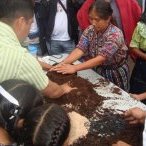English · Español

24 November 2016 | News | Land grabbing | Agroecology | Food Sovereignty
Agroecology work in Guatemala
Download: MP3 (4.2 Mb)
Guatemala has not escaped the exponential advance of monoculture plantations in Latin America in the past decades. Their impacts in terms of Food Sovereignty are being fought in the country through the capacity building and organization of peasant and indigenous communities, with an increasing focus on agroecology.
Since 2002, the Association for the Promotion and Development of the Community - CEIBA - Friends of the Earth Guatemala, has been working to promote agroecological production processes based on the urgency to combat the impacts of "fertilizers and pesticides on the soil, water, food and health", according to the organization.
According to the International Land Coalition, the surface occupied by African palm oil and sugar cane went from 117 thousand hectares in 1990 to almost 290 thousand hectares in 2010. In 2013, the country became the world´s first producer of palm oil per hectare, according to the Palm Oil Producers Union itself.
Contrary to what is said by the actors in this process, this expansion has generated a series of strong socioenvironmental impacts for rural communities and the country as a whole. A study conducted by Action Aid –Agrofuel Plantations and the Loss of Lands for Food Production in Guatemala}states that "in the past decade, Guatemala went from being a self-sufficient country in terms of food, to a country that depends on the import of yellow corn, rice, wheat and soy, increasingly subjected to the conditions of international food prices and dependent on their availability at international level".
In Petén department, palm oil monoculture plantations generate serious impacts, such as pollution of water sources with agrotoxics, the displacement of peasants and the introduction of the crop in protected areas.
The extractive and hydroelectric megaprojects add up to the landscape of threats against the building of Food Sovereignty in Guatemala.
Bottom up
With different initiatives of work at community level, CEIBA is promoting agroecological production together with almost 3500 families from 90 communities distributed in 4 departments of the country.
The organization summarizes these experiences in: community seed centers; promotion of diversified production systems; exchange of experiences among small farmers; capacity building processes for agroecological promoters; campaigns to promote and raise awareness about agroecology and food sovereignty, seed markets and agroecological input promotion; cooking markets, promotion of community and municipal small farmer markets; sustainability schools with children and young people.
Awareness raising and organization around threats, which is also a part of the work at community level, promoting campaigns against GMOs (achieving in 2014 the repeal of the "Monsanto Bill") and advocacy and lobby actions at community and governmental level against sugar cane and African palm oil monoculture plantations.
In these years of work, CEIBA shares some of the victories in the building of agroecology in the country.
This way, they make reference to the capacity building of around 900 agroecological production and food sovereignty advocates, who work in their own communities; the establishment of 300 agroecological fields with alternative production systems and four seed recovery and conservation centers.
The organization also highlights that these initiatives have allowed them to make profits and to become self-sufficient "through the local commercialization of their surplus and through a solidarity-based commercial exchange in community and municipal markets".
More information: www.ceibaguate.org
Imagen: CEIBA







